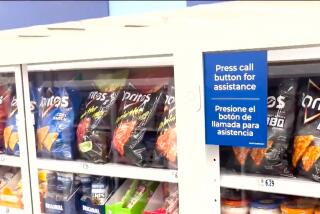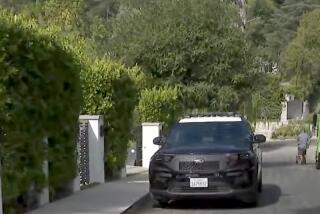A lock on the market
- Share via
Kirk Tatman did not have an open house the morning he put his Lake Forest condo up for sale. He wasn’t even home. So he was unprepared for the rush of real estate agents gaining entry to his home with the house key in the lockbox hanging from the door.
“Before we got home that afternoon, four real estate agents had already walked through our house. We weren’t prepared,” he said of the house, which wasn’t clean, “and the bed wasn’t made.”
But his embarrassment evaporated two days later when he accepted an offer just under his $236,000 asking price. Tatman, who now lives in Irvine, believes the lockbox, the ubiquitous little key safe that dangles from houses on the market nationwide, helped him sell quickly.
Despite the convenience and technological advances in lockboxes, not all home sellers are comfortable using them. A few feel the boxes put them at the mercy of agents, although the seller’s permission is required to attach one to a front door handle or someplace slightly more discreet, such as a vegetation-covered pipe in a nearby garden.
Many owners fear homes with lockboxes make tempting targets for thieves and opt for appointment-only showings. While such burglaries are rare in Los Angeles, they do occur sporadically, according to LAPD detective supervisor Dan Schultz. While there was a pattern of lockbox crimes about four years ago, he said, “I haven’t seen anything since.”
Today’s high-tech lockboxes make cracking them harder for criminals than the older combination models. The widely used Supra Advantage Express KeyBox, for instance, retains the names and time of entry of the 43 agents who most recently entered the home. And Supra’s new iBox key safe records 100 entries and even allows sellers’ agents to access this information via the Internet and to e-mail a report to their clients.
Smart lockboxes were instrumental in the arrest of a Bothell, Wash., real estate agent in November after a series of burglaries in homes with lockboxes. The Advantage Express KeyBoxes installed on the burglarized homes provided police with an easy audit trail.
“It was the lockbox system that allowed us to catch her,” said Sgt. Kevin Fagerstrom in media relations at the King County Sheriff’s Office. “Its proper operation and documentation allowed us to focus on the suspect.” The agent has not been charged. Authorities continue identifying victims and matching them with recovered property.
Despite these technological advances, however, some sellers remain opposed to the lockbox and ask their agents not to use one. This sometimes creates conflicts with agents, many of whom believe the key safe guarantees a faster home sale.
Homeowners who don’t use agents, including those who market their homes on Web sites, also have varying opinions about lockboxes. When Cindy Rodriguez of Chula Vista listed her home on SoCal for Sale by Owner (SoCalFSBO.com), she nixed the lockbox for security reasons. “At the time I was a stay-at-home mom and didn’t want people coming in and out of the house.”
But Sou Smith, who used the same site to sell her Long Beach home, used a lockbox and believes it helped her home sell faster by enabling it to be shown frequently. “Real estate agents could come into the house without my presence.”
As for security concerns? “I had good neighbors who would keep an eye on the house,” Smith said, “so I felt comfortable.”
Although FSBO sellers such as Smith must use their own lockbox, agents typically bear the burden of purchasing and maintaining the device. More than 80% of agents nationwide use electronic lockboxes, according to Supra Chief Executive Greg Burge.
The alternative is the mechanical lockbox, with its easy-to-crack combination dials, which dates back to the era of the $20,000 tract home. It’s about as safe as “putting a key under the mat,” said June Barlow, vice president and general counsel for the California Assn. of Realtors.
“With a mechanical lockbox, you have no way of knowing who enters the house,” said Supra marketing and communications manager Felechia Young.
When one of these older key safes is used, visiting agents are expected to leave their business cards. But if the practice is ignored, sellers have no way of knowing who visited.
“Sometimes I’d find out afterward that a person came and hadn’t left a card,” said Barbara Gildner, who recently sold her home in Laguna Niguel through an agent who used a mechanical lockbox. “I didn’t always know if they had been there.”
From a security standpoint, the electronic box’s ability to track visitors puts many homeowners at ease. “My agent explained how the lockbox tracks and monitors each agent,” Tatman said, “and that made me feel better.”
Electronic boxes also can be programmed to limit visiting hours. The new iBox can even block entry on specific days, such as weekends when the family is home.
Agents in affluent Beverly Hills, Bel Air, Brentwood and Pacific Palisades eschew the lockbox, which they claim compromises the seller’s security and privacy.
“When interviewing an agent, you should be careful to ask how your property will be shown,” said Betty-Jo Tilley, an agent for Prudential John Aaroe & Associates in Pacific Palisades. “The convenience of the lockbox is strictly to the agent. It allows the agent to have more inventory and service it less.”
In fact, Tilley believes that appointment-only homes sell faster. “You need to disseminate information to the buyer and the buyer’s agent to get a house sold,” she said, which doesn’t happen if the seller’s agent is not there.
The lockbox-free preference of the Westside real estate market carries a certain snob appeal. With housing prices in the $1-million-and-up range, appointment-only showings confer a home’s gold-label status.
Westside sellers, including entertainment-industry glitterati, “demand” appointment-only showings, according to Stephen Baker, an agent for Coldwell Banker Beverly Hills North. Celebrities don’t want fans and tabloid reporters sniffing through their sock drawers.
An opulent home also needs shrewd marketing to justify its price tag. “Each house here has different amenities to point out, and only the [seller’s] agent knows what the property’s benefits are,” Baker said.
Elsewhere, however, agents prefer the lockbox. Appointment-only listings require significant schedule juggling with the client, the seller’s agent and the seller, agents claim.
“If there’s not a lockbox on a home, I probably don’t have time to see it,” said Charlotte Laws, a Prudential agent in Studio City.
“If you want to sell your house ... make it available to people when they want to see it,” said zipRealty agent Brett Vratil, who covers a large section of L.A., including the Westside and the Valley.
However, it’s difficult to verify whether homes with lockboxes sell faster than appointment-only listings. Neither the National Assn. of Realtors nor the California Assn. of Realtors breaks down home sales into lockbox-versus-appointment categories.
The bottom line is that if homeowners like lockboxes, agents will use them.
“There hasn’t been much trouble with people doing bad things with boxes,” said homeowner Gildner, who plans to use a key safe the next time she sells a house.
Buyers are more comfortable if you’re not there, she said. “They feel free to really look around.”
Jeff Bertolucci is a freelance writer in Agoura Hills.
More to Read
Inside the business of entertainment
The Wide Shot brings you news, analysis and insights on everything from streaming wars to production — and what it all means for the future.
You may occasionally receive promotional content from the Los Angeles Times.










